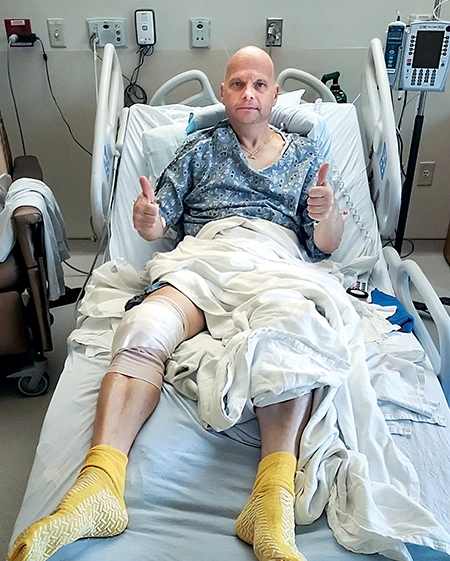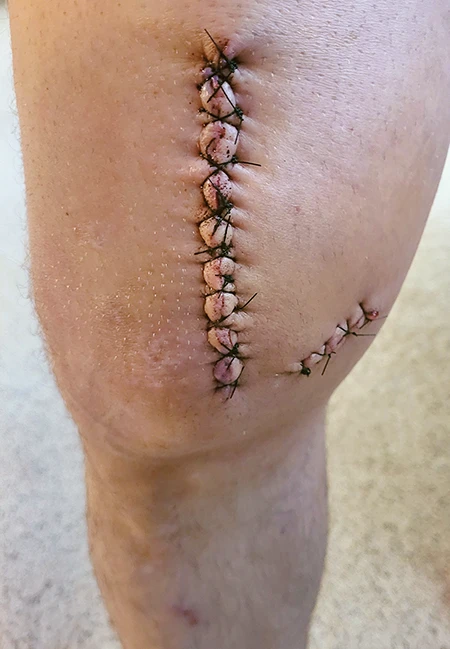About 12 years ago, a pair of commercial dive operators began offering adventurous divers a chance to go blackwater diving off the coast of Florida. Since then, blackwater dives have become an established fixture in the Palm Beach dive community, and I have been fortunate to log more than 1,000 such dives without incident.
Blackwater diving entails traveling into deep water at night and drifting along to see what weird and wonderful animals pass by or come up from the depths. Over the years, blackwater divers occasionally saw large predatory fish curiously swimming by. Most of these large animals show little interest in interacting with strange, noisy human intruders. There is always a remote possibility of a negative encounter, and a few fictional claims have circulated, but there were no real incidents in those 12 years, to my knowledge. Unfortunately, nature doesn’t always follow the script.
May 17, 2024, turned into one of those unscripted nights. The seas were calm, and we had a local boat fully loaded with divers as we cruised 6.5 miles (10.5 kilometers) offshore to waters 750 feet (229 meters) deep. After entering the water, I quickly descended and found a deepwater cusk-eel larva after just a few minutes. Just as I finished taking photographs something struck my right leg with such force that my entire body vibrated. I had experienced small fish and squid bumping into me during blackwater dives, but the impact of this hit was indescribable.

I looked down at my leg but was completely unprepared for what I saw. Just a few feet below me, a 5-foot (1.5-m) spearfish with its sail fully open stared back and then leisurely swam away. Blood was draining out of a hole in my wetsuit where the fish’s bill had speared my leg. It immediately crossed my mind that if the bill had hit an artery, the situation could quickly become dire, so I made a rapid but controlled emergency ascent.
Fortunately, I was only seven minutes into the dive, so I was not too concerned about nitrogen buildup. The possibility of complications from a rapid ascent still crossed my mind, but I didn’t have any negative effects. My primary concern was to stop the bleeding as quickly as possible. I surfaced and used my emergency signaling device’s loud sound to get the captain’s attention. The boat was quickly next to me, and I was able to get back on board. The crew applied a tourniquet above the puncture wound. We realized that the fish had somehow missed any major blood vessels, and we were able to quickly stop the bleeding. The captain and deckhand provided excellent first aid and bandaged the wound.
With everything under control, I called the DAN hotline while still on the boat to ask for advice on the next steps. After confirming that I did not need transport or evacuation, the DAN representative provided the recommended wound care procedures. After reaching shore, my friends drove me to the emergency room. The situation’s seriousness became apparent as the adrenaline wore off and some time passed.
The pain worsened exponentially, and my leg became significantly swollen. Imaging revealed the situation’s true seriousness: a piece of the billfish’s rostrum was lodged in my leg just above my knee. They admitted me to the hospital to receive several rounds of IV antibiotics and undergo general surgery to remove the foreign object. I had surgery 36 hours after the incident and stayed in the hospital for three days.

Even though a hefty medical bill was a foregone conclusion, knowing that I had DAN insurance gave me tremendous peace of mind during this chaotic time. Since 1999 I have consistently renewed my DAN membership and insurance every year in case of an unforeseen dive accident. I do a significant amount of diving and always knew in the back of my mind that a freak dive accident was possible. I am thankful that I had the foresight to keep my membership up-to-date and that DAN is an option for divers.
Nature is unpredictable, and I will never know why this fish decided to impale me, but I am grateful for the positive outcome and all the support DAN offered throughout the incident.
© Alert Diver – Q4 2024